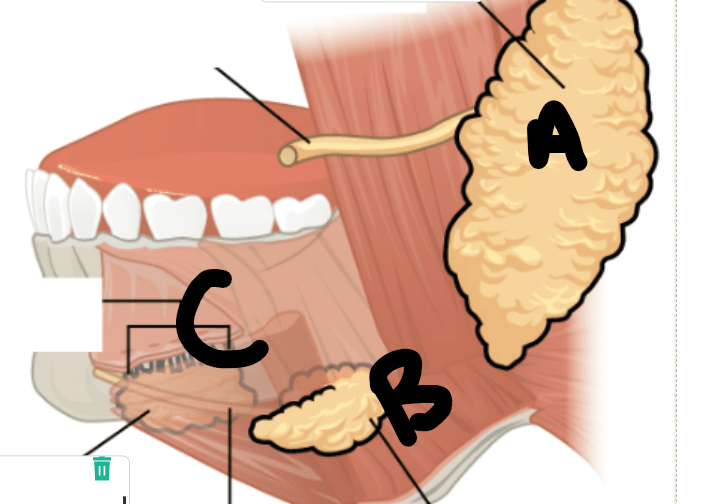What are the directional terms for front and back?
Anterior/posterior
Answers could include protection, support, hematopoiesis, movement, storage, production of heat
Which point moves during a muscle contraction-- origin or insertion?
insertion
Arteries- away
Veins- towards
True or false: the upper respiratory tract includes the trachea.
False
Name the two main functions of the digestive system?
digestion and absorption
What is normal blood pressure?
120/80 mmHg
What is the name for the cavity that contains BOTH the spinal and cranial cavities?
The dorsal cavity
What are the 4 types of bones we have in our human skeleton?
Flat, irregular, long, short
Do you use heavy weight or light weight for endurance training? Do you use low reps or high reps?
What about for bulk strength training?
Light weight; high reps for endurance
Heavy weight; low reps for bulk strength
The top number in blood pressure is ______ and the bottom number is _______.
Systolic; diastolic
What are 2 of the functions of the respiratory system?
Air distributor, gas exchanger, also...
Filters air
Warms air
Humidifies air
Many organs in this system also influence our speech
Can also influence our sense of smell
What is the difference between constipation and diarrhea?
Constipation- bowel movement takes too long, not enough water in waste
Diarrhea- bowel movement happens too quickly, too much water in waste
When looking at a body on a screen, on paper, or another human, it is important to remember that their right side is on your ______ side.
During medieval times, the guillotine was used for executions. It removed the head from the rest of the body. What type of plane does the guillotine cut in?
The transverse plane
What are the two types of cells in bones and what does each do for bone formation?
Osteoblasts- building up new bone
Osteoclasts- break down bone
______ muscles help the prime mover muscle produce movement and ______ muscles perform the opposite movement.
Bonus 100 pts: Give an example of one muscle in the body and its antagonist.
Synergistic; antagonistic
Examples: biceps brachii/triceps brachii; rectus femoris/biceps femoris
One of the most important features of the heart is its _____ which help direct blood flow. Please list all 4 of these that we discussed in class.
1. pulmonary semilunar valve
2. aortic semilunar valve
3. tricuspid valve
4. bicuspid/mitral valve
What is pulmonary ventilation?
breathing, or the process that moves air in and out of the lungs
Label the 3 glands in the mouth.

A: Parotid
B: Submandibular
C: sublingual
What are the only arteries in the human body that contain deoxygenated blood?
Pulmonary arteries
Draw and label the planes that we learned about in class (need 4).
Teacher check.
:max_bytes(150000):strip_icc()/1000px-Human_anatomy_planes.svg-5c414c7dc9e77c0001908b1b.png)
Which joint allows you to move your head to the right and to the left?
Pivot joint
Provide an example of plantar flexion and for circumduction.
Plantar flexion: standing/walking on tiptoes
Circumduction: windmilling arms (arm circles); rotating hip around
alveoli and the capillaries
What are the two parts of pulmonary ventilation? What does each mean?
Inspiration: when we inhale/breathe in oxygen
Expiration: when we exhale/breathe out carbon dioxide
What are the 2 types of digestion? Name a location of each.
Mechanical- mouth, stomach, small intestine
Chemical- mouth, stomach, small intestine, pancreas
There are __ cervical vertebrae, __ thoracic vertebrae, __ lumbar vertebrae, and __ sacral vertebrae.
7, 12, 5, 5
On a body (can be a stick figure), show me the directional arrows for inferior, superior, lateral, and medial.
Inferior (arrow pointing down), superior (arrow pointing up), medial (arrow pointing towards belly button/center), lateral (arrow point towards the outside/towards the arms)
The hip and shoulder joints are examples of _______ joints and they can perform the muscle movement called________ (hint: this is a movement that incorporates several others).
ball and socket; circumduction
What are the 4 types of muscle contractions? Give a brief description of each.
Isometric- tension in muscle; no shortening/movement
Isotonic- tension causes the muscle to change length (i.e. shorten)
Twitch- quick, jerky response
Tetanic- sustained response longer than a twitch (sometimes called tetanus)
List the steps in blood flow starting at the superior/inferior vena cava.
Inferior/superior vena cava, right atrium, tricuspid valve, right ventricle, pulmonary semilunar valve, pulmonary arteries, lungs/alveoli, pulmonary veins, left atrium, bicuspid/mitral valve, left ventricle, aortic semilunar valve, aorta, arteries, arterioles, capillaries, venules, veins
What is tidal volume?
How much air we inhale into our lungs during NORMAL inspiration and how much we expel during NORMAL expiration
List 5 of the key players of the digestive system. (Remember you need to know what they do.)
What type of joint is in one spot in your entire body? What is the joint called and where is it?
Saddle joint- in the thumb!